*NURSING > QUESTIONS & ANSWERS > Compiled all Maternity Case 2: Brenda Patton - vSim for Nursing & pre/post sim quiz. Latest Question (All)
Compiled all Maternity Case 2: Brenda Patton - vSim for Nursing & pre/post sim quiz. Latest Questions with answers. Rated A
Document Content and Description Below
The nurse is providing education to a patient about group B streptococcus (GBS) during a prenatal visit. This education session would include which statement from the following choices? - Ans-Between ... 35 and 37 weeks' gestation, GBS screening is done to detect this bacteria. What are the possible complications that a newborn can acquire from the mother with a positive GBS status during the birthing process? - Ans-Pneumonia, sepsis, meningitis. The nurse is carrying out a provider's order to administer an antibiotic by intravenous secondary infusion. In what order would the nurse complete the steps below? - Ans-1.) Verify the provider's order 2.) Check the patient's allergy status 3.) Confirm patient identity with two identifiers 4.) Explain the procedure to the patient 5.) Assess the patient's IV site 6.) Check the rights of medication administration A laboring woman with a positive GBS status was admitted to the hospital with ruptured fetal membranes. What maternal temperature reading would be reported to the primary healthcare provider? - Ans-100.8 F A patient is admitted in active labor, and she has a right occipitoanterior (ROA) presentation. The nurse is applying the external fetal monitor. Where does the nurse place the fetal ultrasound transducer? - Ans-Right lower quadrant. A patient with ruptured fetal membranes has been in labor for several hours. What signs and symptoms of intrapartum infection would the nurse report to the primary medical provider? - Ans-Cloudy, foul-smelling vaginal discharge. Fetal heart rate at 168 bpm. A primigravida is admitted to labor and delivery. A review of her prenatal records revealed a urinanalysis with a negative WBC count, RBC count, leukoesterase, and nitrates, and positive glucose and ketones; a serology report that was positive for hepatitis B surface antigens; and a microbiology report positive for GBS. For which of the following reasons would the nurse initiate intrapartum prophylaxis antibiotics? - Ans-Positive GBS culture. What range is considered a normal baseline FHR? - Ans-110 to 160 bpm In what stage and phase of labor is a woman experiencing contractions every 5-10 minutes and with a vaginal examination of 2cm dilation, 50% effacement, and -2 station? - Ans-First stage, latent phase The nurse needs to administer an IV dose of Pencillin G potassium to a laboring woman. This client has a peripheral IV lock. Which of the following is the safest method to give this dose of medication? - Ans-Check IV for patency with 3mL of 0.9% normal saline and attach the dose through intravenous piggyback (IVPB) Brenda Patton was admitted in active labor 5 hours ago and she has NKDA. Her GBS was positive. There are orders to receive intrapartum antibiotics. Which of the following would the nurse anticipate administering to Ms. Patton? - Ans-Penicillin G potassium, 5 million units After a laboring patient with a positive GBS status received a dose of penicillin, she complains of itchy bumps and difficulty breathing, and her blood pressure is 102/52 mmHg. What do you think is occurring? - Ans-Anaphylaxis. The nurse is interpreting the external fetal monitoring strips for Ms. Patton while she is in active labor. Which findings indicate that the fetus is tolerating labor? - Ans-Moderate variability, accelerations, early decelerations. Ms. Patton is a primigravida at 38 2/7 weeks' gestation, and she has a positive GBS status. The nurse received report that this patient's last vaginal exam showed 50% effacement, 4cm dilation, and -2 station. Ms. Patton stated that she thinks her water broke sometime this morning. What initial action would the nurse take? - Ans-Ask the patient to estimate the time when she thought her water broke. Ms. Patton was admitted in labor 2 hours ago, and it was determined that her membranes have ruptured. Which of the following maternal assessments would have the highest priority? - Ans-Temperature Ms. Patton has a positive GBS status. Her mother asks the nurse, "Why does my daughter need antibiotic? She wants a natural birth." What is the best response by the nurse? - Ans-This antibiotic will reduce the risk of the baby getting an infection from your daughter. The nurse interprets the initial assessment data for Ms. Patton, who was admitted in active labor. Which of the following assessments would the nurse communicate to the provider? - Ans-Maternal temperature of 100.6 F The nurse is promoting Ms. Patton's plan for a natural birth. What interventions would be supportive of this decision? - Ans-Teach breathing techniques. Use therapeutic touch. Assist with attention focusing. The nurse is applying an external fetal monitor to Ms. Patton after she's admitted to labor and delivery. In what order would these steps be performed before applying the monitor? - Ans-1.) Verify order 2.) Perform hand hygiene 3.) Confirm patient identity using two identifiers 4.) Explain the procedure to the patient 5.) Place the patient in a left-lateral position Ms. Patton states her pain level is 3 to 4 out of 10 and she is moaning during contractions. She is in active labor, and she is attached to the external fetal monitor. Which of the following responses by the nurse would be most appropriate? - Ans-Suggest to the patient that she can use the birthing ball. What range is considered a normal baseline FHR? - Ans-110-160 BPM The nurse is providing education to a patient about group B streptococcus (GBS) during a prenatal visit. This education session would include which statement from the following choices? - Ans-Between 35 and 37 weeks' gestation, GBS screening is done to detect this bacteria. A patient is admitted in active labor, and she has a right occipitoanterior (ROA) presentation. The nurse is applying the external fetal monitor. Where does the nurse place the fetal ultrasound transducer? - Ans-Right lower quadrant A primigravida is admitted to labor and delivery. A review of her prenatal records revealed a urinalysis with negative white blood cell (WBC) count, red blood cell (RBC) count, leukoesterase, and nitrates, and positive glucose and ketones; a serology report that was positive for hepatitis B surface antigens; and a microbiology report positive for GBS. For which of the following reasons would the nurse initiate intrapartum prophylaxis antibiotics? - Ans-Positive GBS culture The nurse is carrying out a provider's order to administer an antibiotic by intravenous (IV) secondary infusion. In what order would the nurse complete the steps below? - Ans-1)Verify the provider's order 2)Check the patient's allergy status 3)Confirm patient identity with two identifiers 4)Explain the procedure to the patient 5)Assess the patient's IV site 6)Check the rights of medication administration The nurse needs to administer an IV dose of penicillin G potassium (Pfizerpen) to a laboring woman. This client has a peripheral IV lock. Which of the following is the safest method to give this dose of medication? - Ans-Check IV for patency with 3 mL of 0.9% normal saline and attach the dose through intravenous piggyback (IVPG) A patient with ruptured fetal membranes has been in labor for several hours. Which signs and symptoms of intrapartum infection would the nurse report to the primary medical provider? (Select all that apply) - Ans-Cloudy, foul-smelling vaginal discharge, Fetal heart rate (FHR) 168 beats per minute (bpm) What are the possible complications that a newborn can acquire from the mother with a positive GBS status during the birthing process? (Select all that apply) - Ans-Pneumonia, Sepsis, Meningitis A laboring woman with a positive GBS status was admitted to the hospital with ruptured fetal membranes. What maternal temperature reading would be reported to the primary health provider? - Ans-100.8° F (38.2° C) In what stage and phase of labor is a woman experiencing contractions every 5 to 10 minutes and with a vaginal examination of 2 cm dilation, 50% effacement, and -2 station? - Ans-First stage, latent phase After Ms. Patton receives a dose of penicillin G potassium (Pfizerpen), she complains of itchy bumps on her arms and difficulty breathing, and her blood pressure is 102/52 mm Hg. What does the nurse suspect is occurring? - Ans-anaphylaxis The nurse is interpreting the external fetal monitoring strips for Ms. Patton while she is in active labor. Which findings indicate that the fetus is tolerating labor? (Select all that apply) - Ans-Moderate variability, Accelerations, Early decelerations Ms. Patton has a positive GBS status. Her mother asks the nurse, "Why does my daughter need an antibiotic? She wants to have a natural birth." What is the best response by the nurse? - Ans-This antibiotic will reduce the risk of the baby getting an infection from your daughter. Ms. Patton states her pain level is 3 to 4 out of 10 and she is moaning during contractions. She is in active labor, and she is attached to the external fetal monitor. Which of the following responses by the nurse would be most appropriate? - Ans-Suggest to the patient that she can use the birthing ball The nurse interprets the initial assessment data for Ms. Patton, who was admitted in active labor. Which of the following assessments would the nurse communicate to the provider? - Ans-Maternal temperature 100.6° F (38.1° C) The nurse is promoting Ms. Patton's plan for a natural birth. What interventions would be supportive of this decision? (Select all that apply) - Ans-Use therapeutic touch, Teach breathing techniques, Assist with attention focusing Ms. Patton was admitted in labor 2 hours ago, and it was determined that her membranes were ruptured. Which of the following maternal assessments would have the highest priority? - Ans-Temperature The nurse is applying an external fetal monitor to Ms. Patton after she is admitted to labor and delivery. In what order would these steps be performed before applying the monitor? - Ans-1)Verify the provider's order 2)Perform hand hygiene 3)Confirm patient identity using two identifiers 4)Explain the procedure to the patient 5)Place the patient in a left-lateral position Ms. Patton is a primigravida at 38 2/7 weeks' gestation, and she has a positive GBS status. The nurse received report that this patient's last vaginal exam showed 50% effacement, 4 cm dilation, and -2 station. Ms. Patton stated that she thinks her water broke sometime this morning. What initial action would the nurse take? - Ans-Ask the patient to estimate the time when she thought her water broke Brenda Patton was admitted in active labor 5 hours ago and she has no known drug allergies. Her group B streptococcus status is positive. There are orders for her to receive intrapartum antibiotics. Which of the following would the nurse anticipate administering to Ms. Patton? - Ans-Penicillin G potassium (Pfizerpen), 5 million units A primigravida is admited to L&D and her initial [Show More]
Last updated: 1 year ago
Preview 1 out of 17 pages
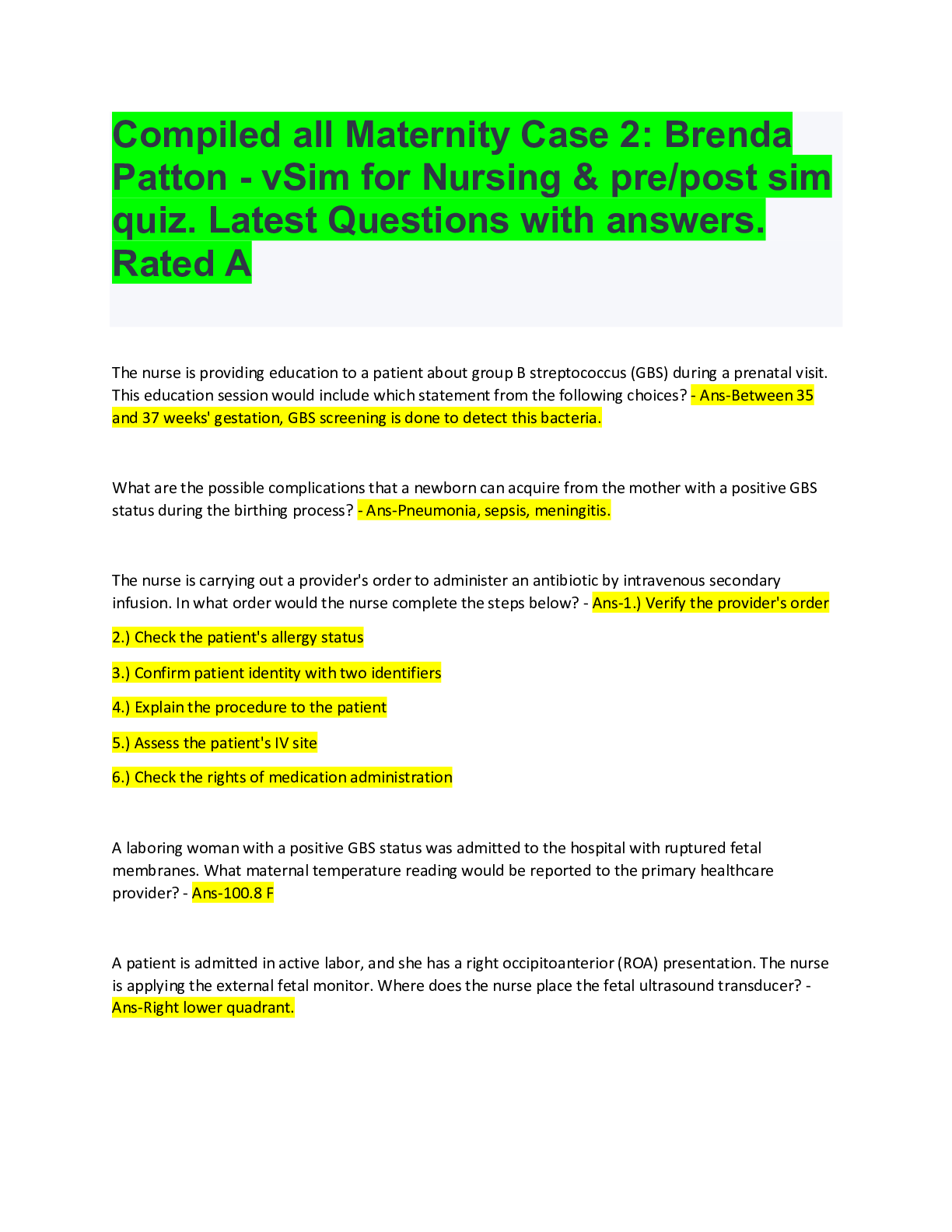
Reviews( 0 )
Document information
Connected school, study & course
About the document
Uploaded On
Jun 17, 2022
Number of pages
17
Written in
Additional information
This document has been written for:
Uploaded
Jun 17, 2022
Downloads
0
Views
82

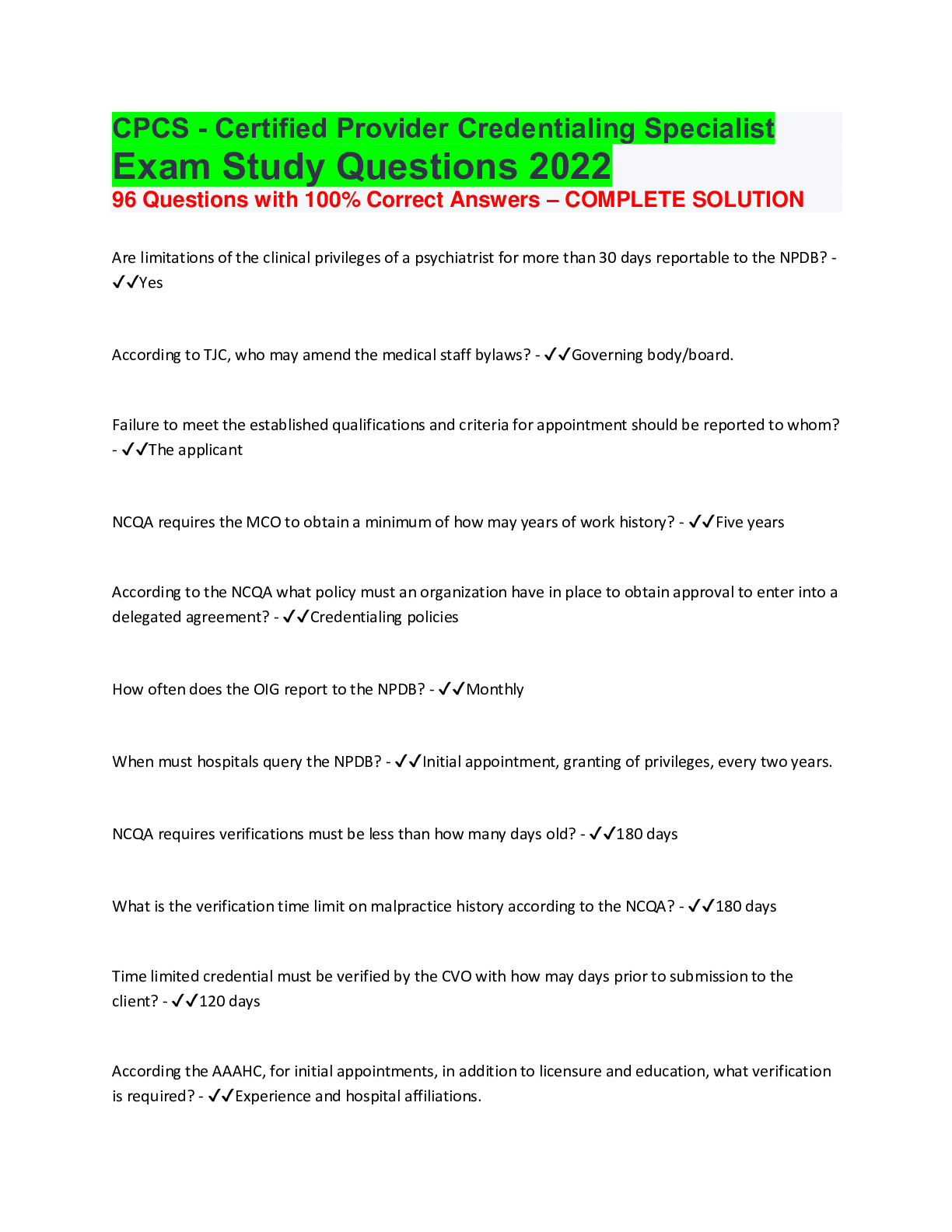
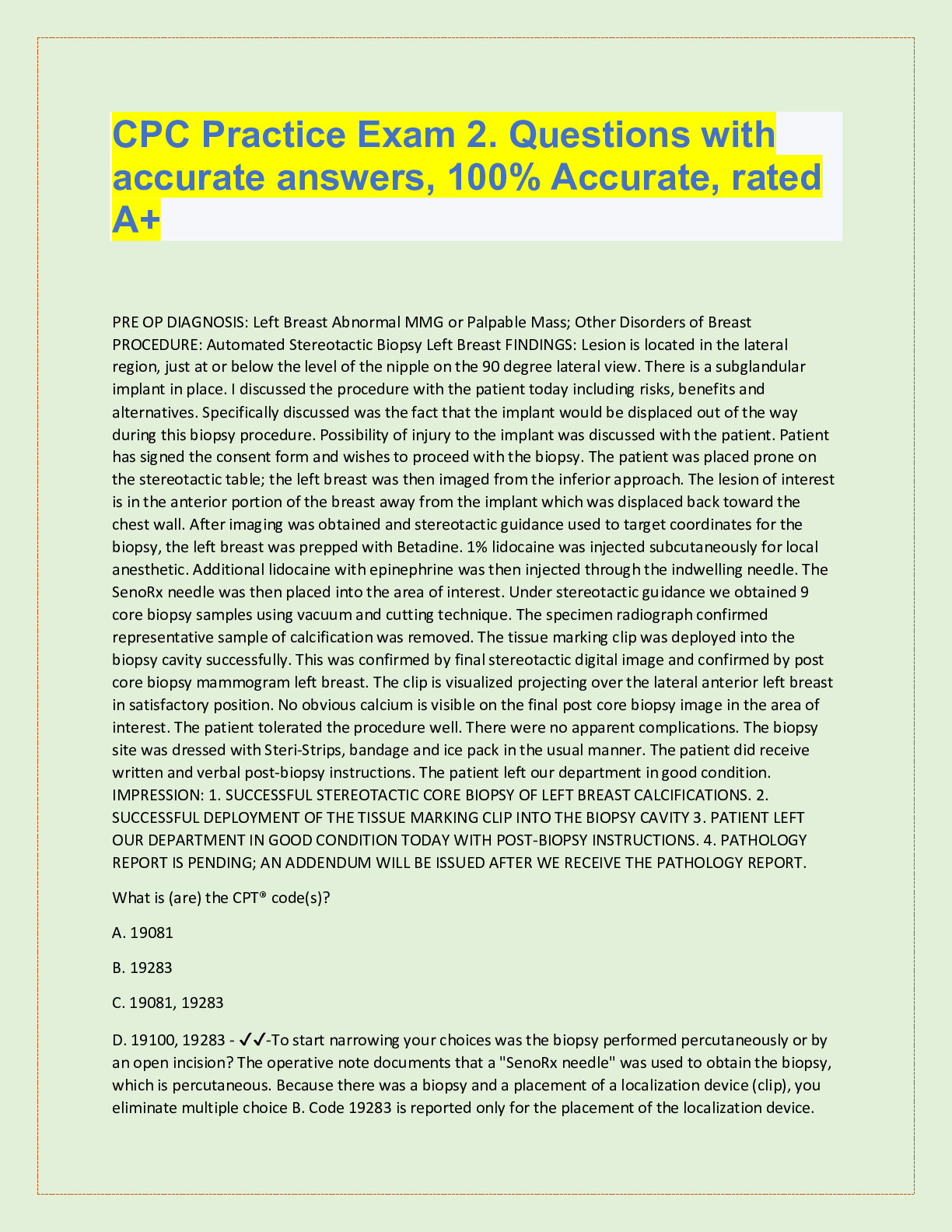

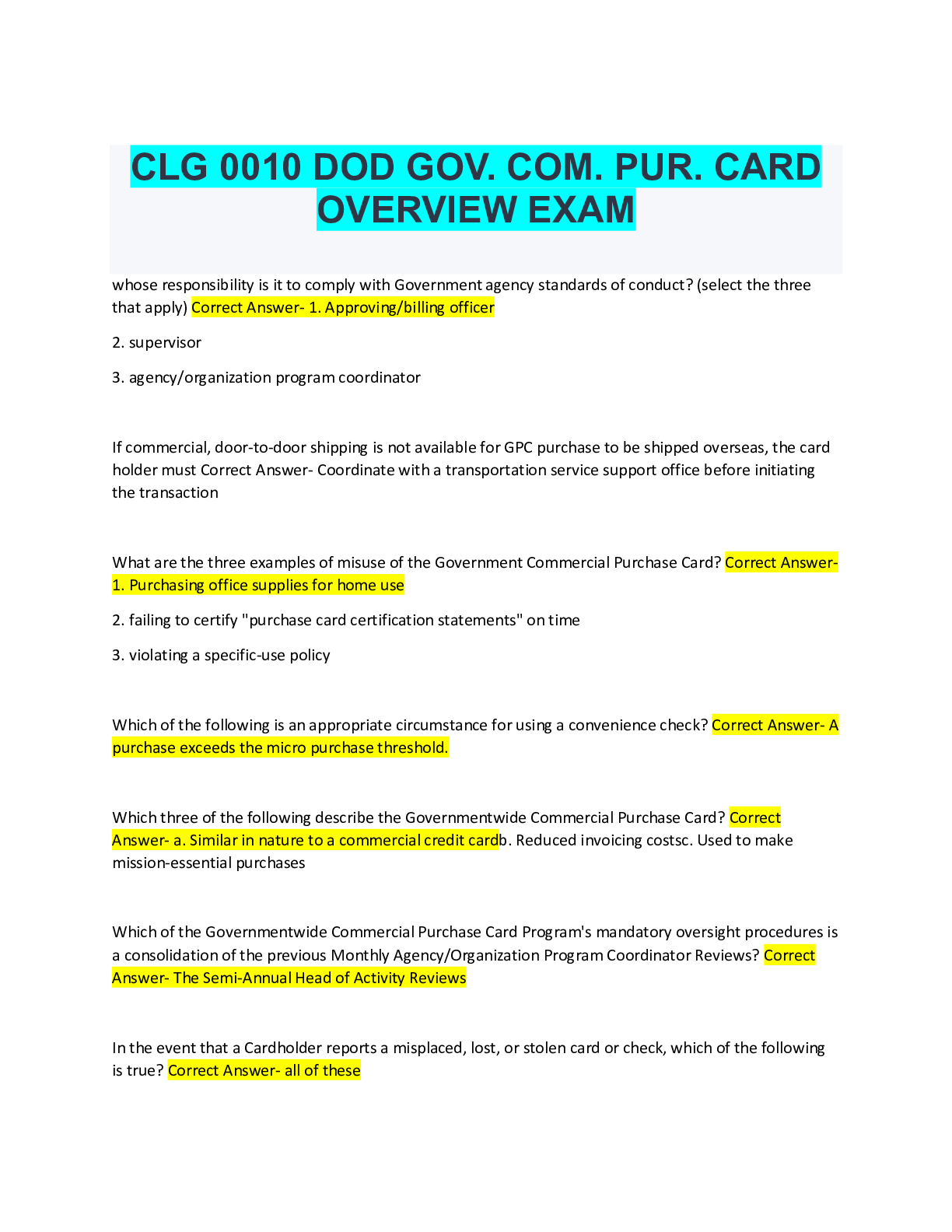

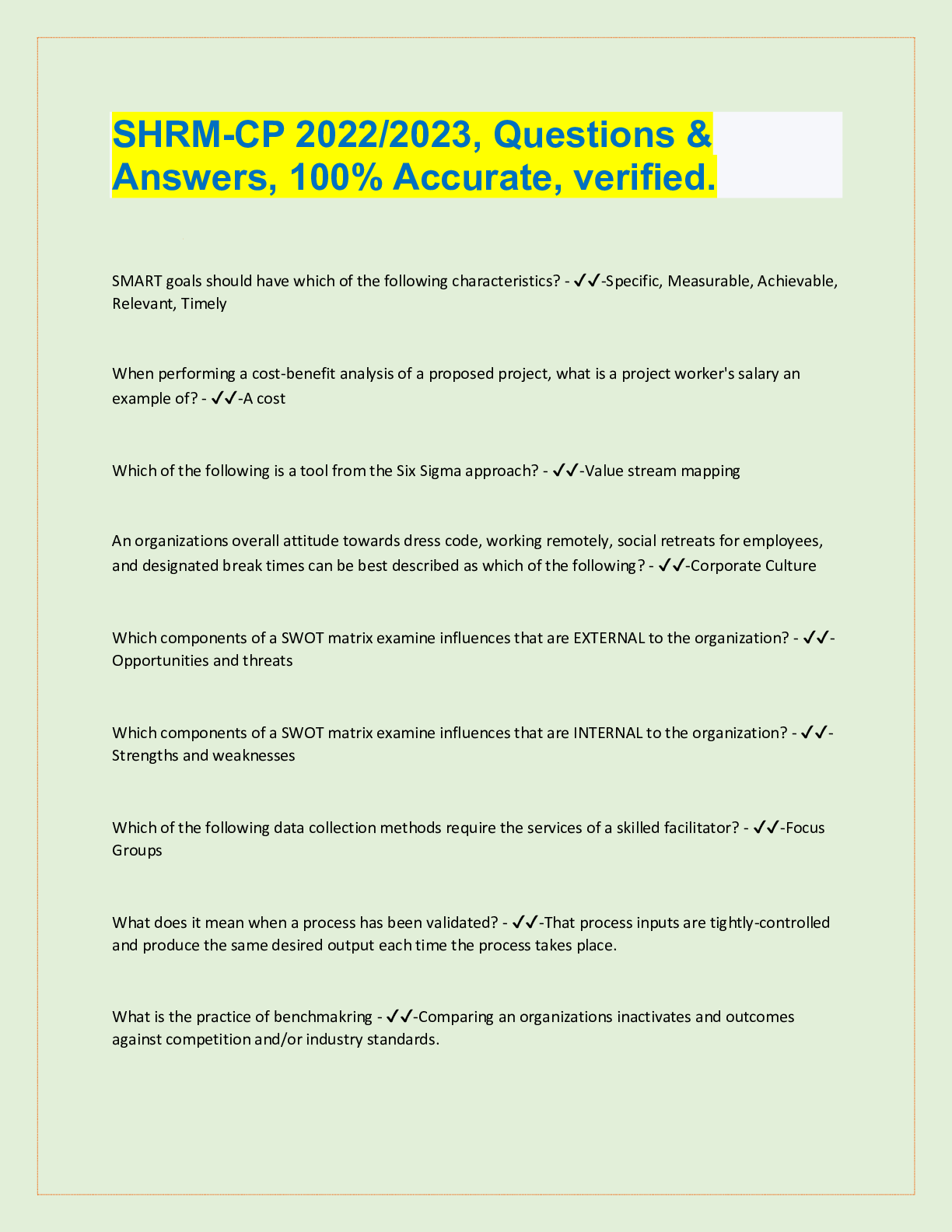
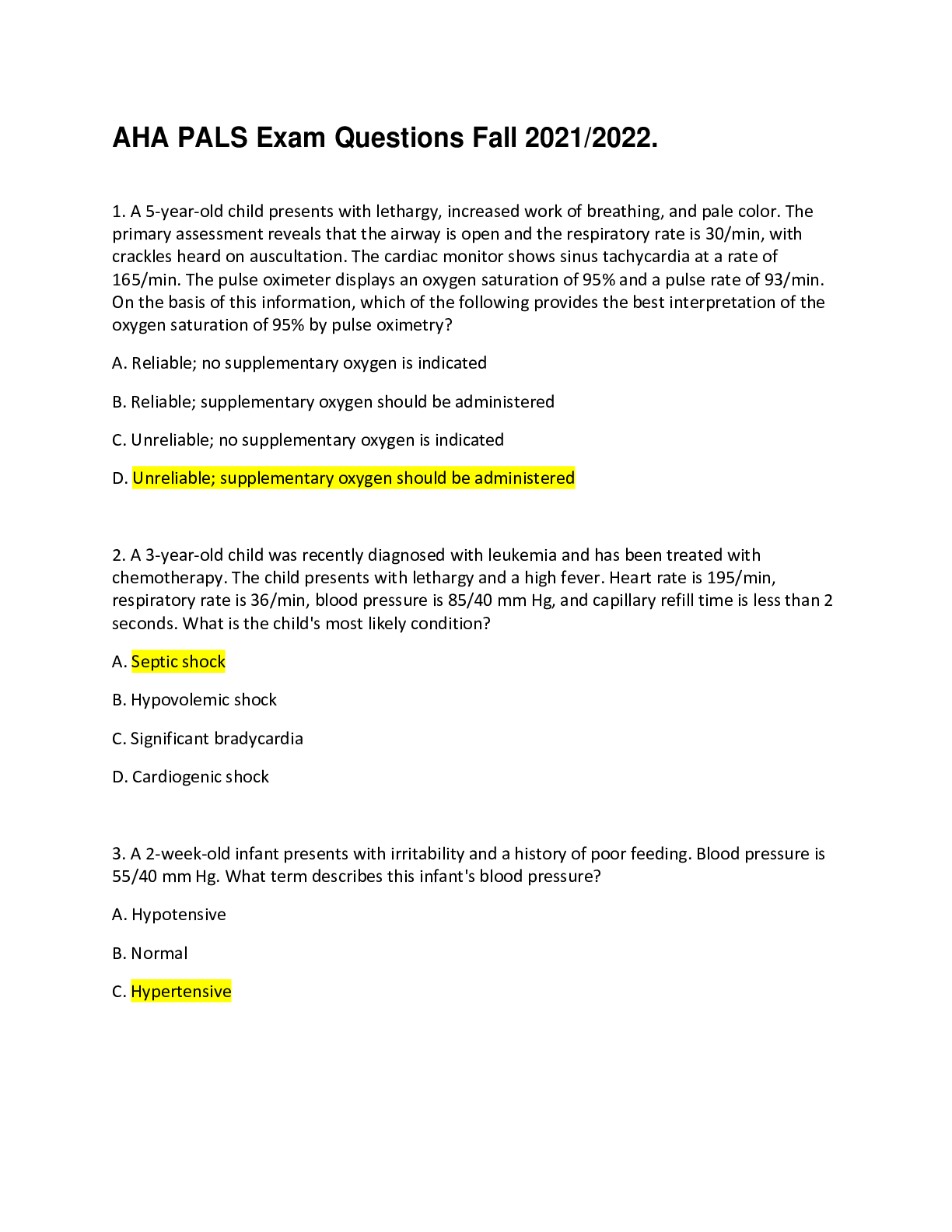
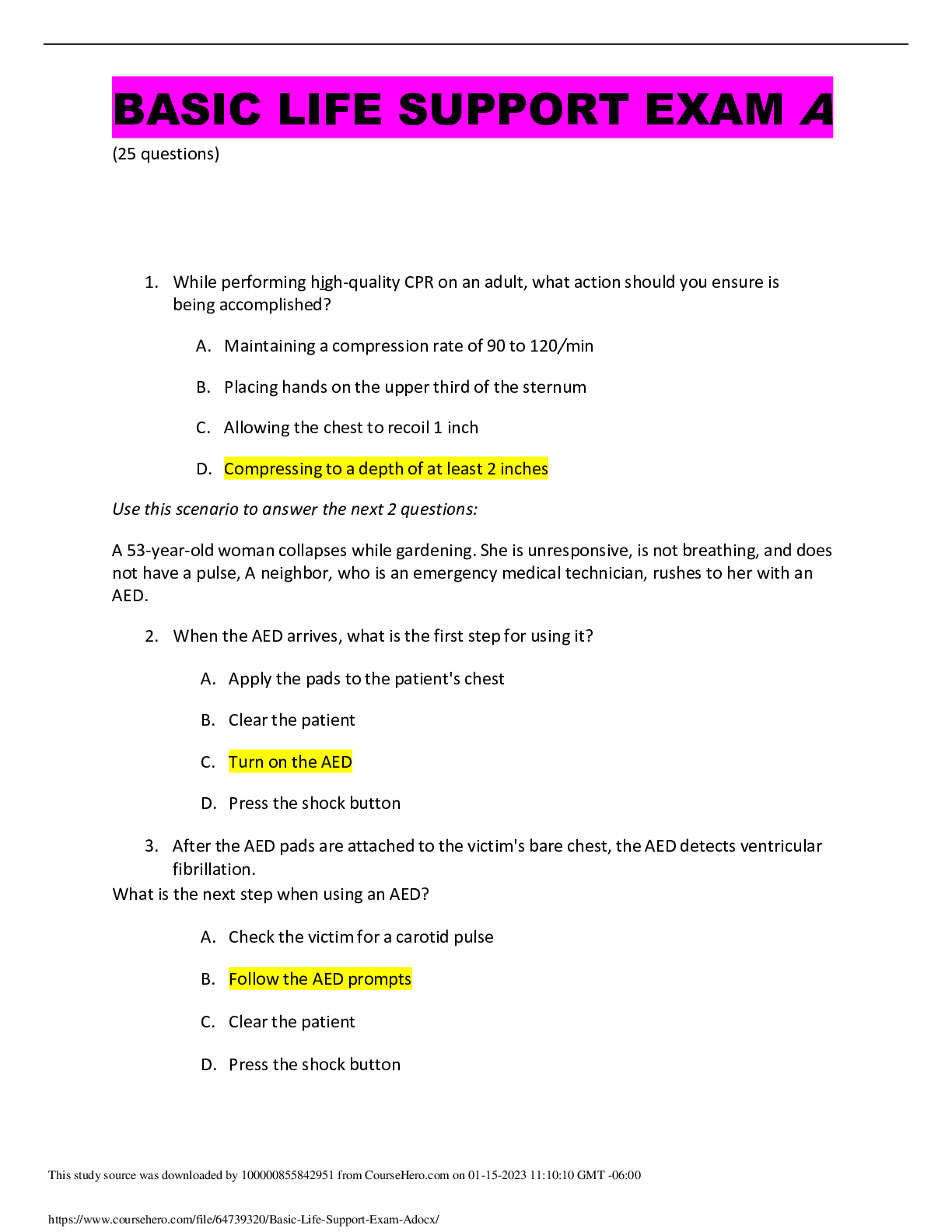
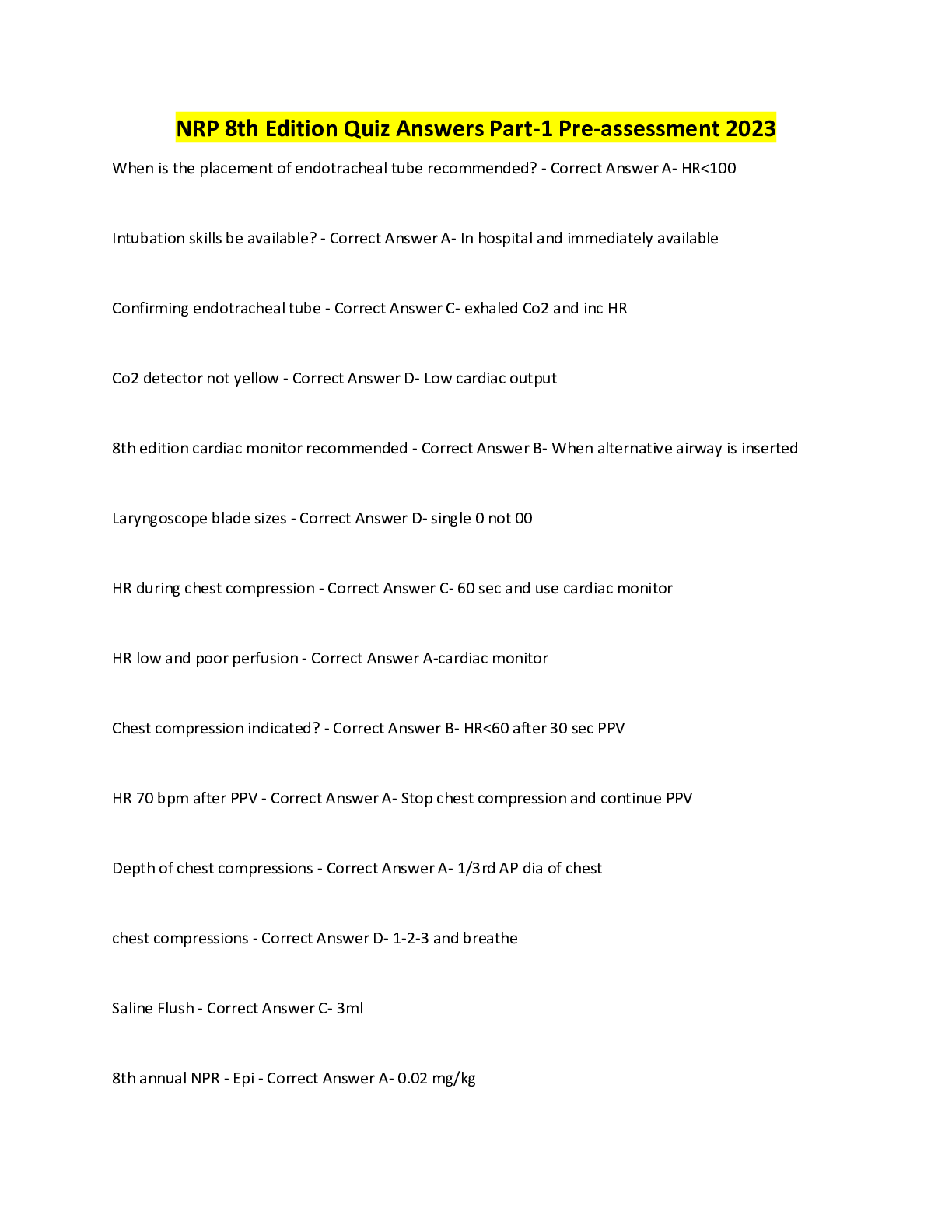

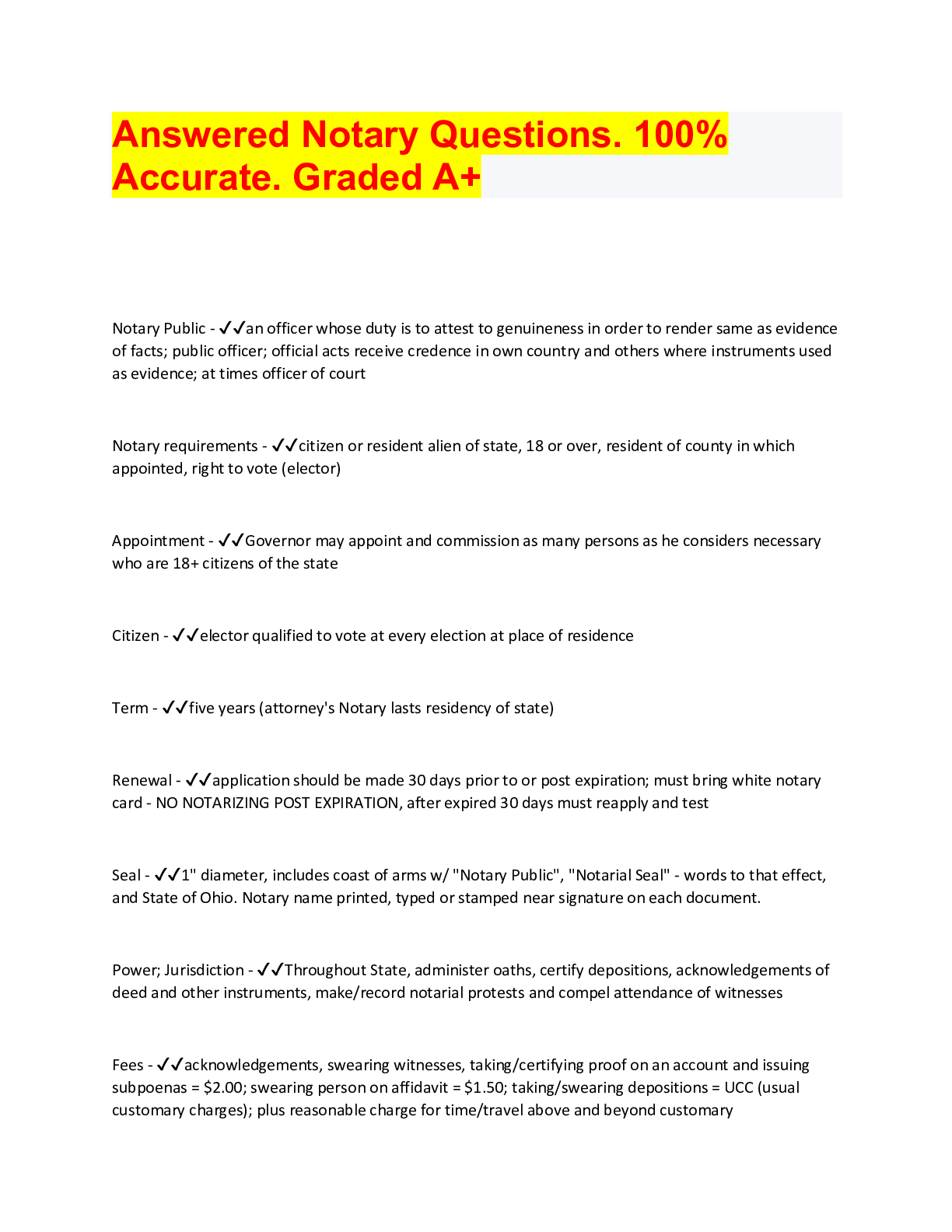

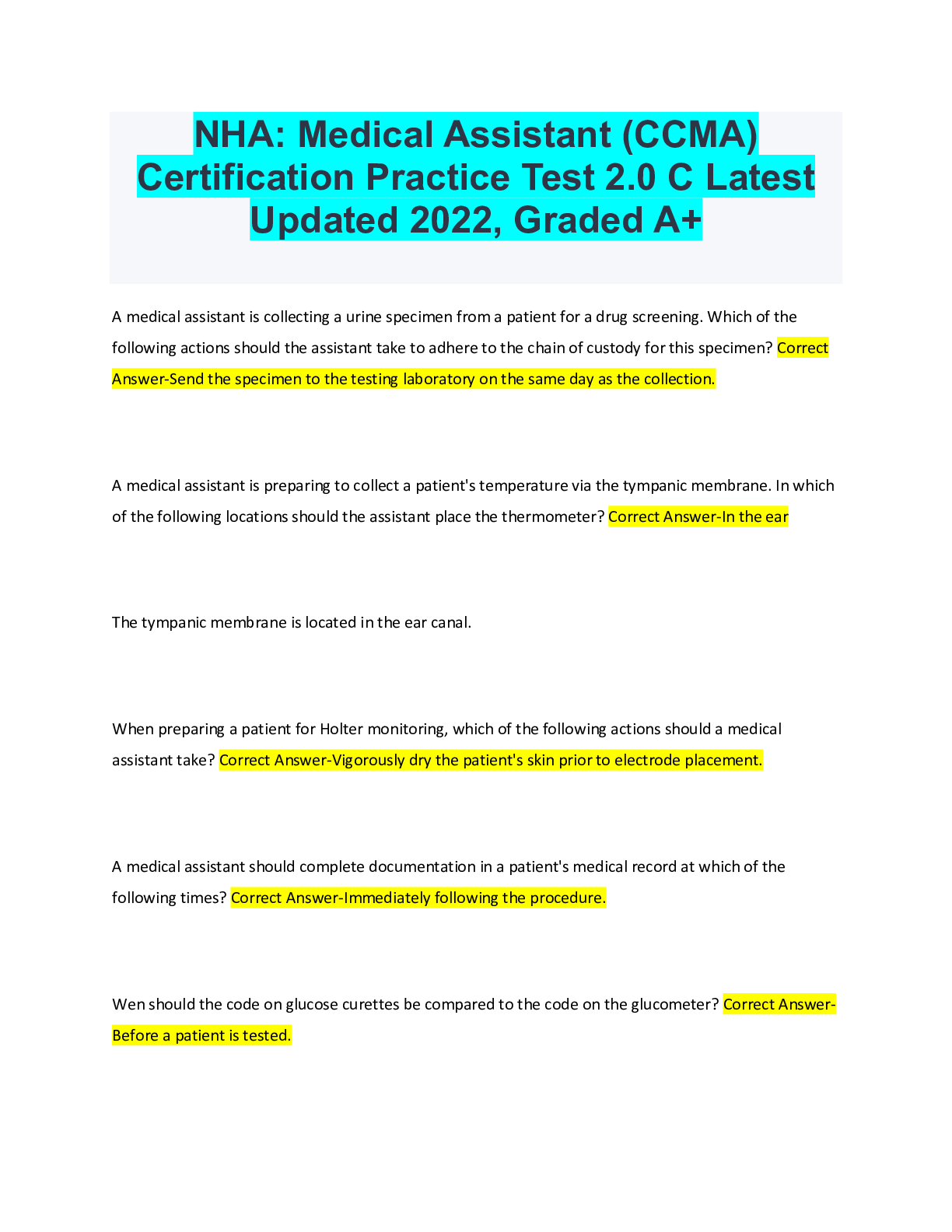

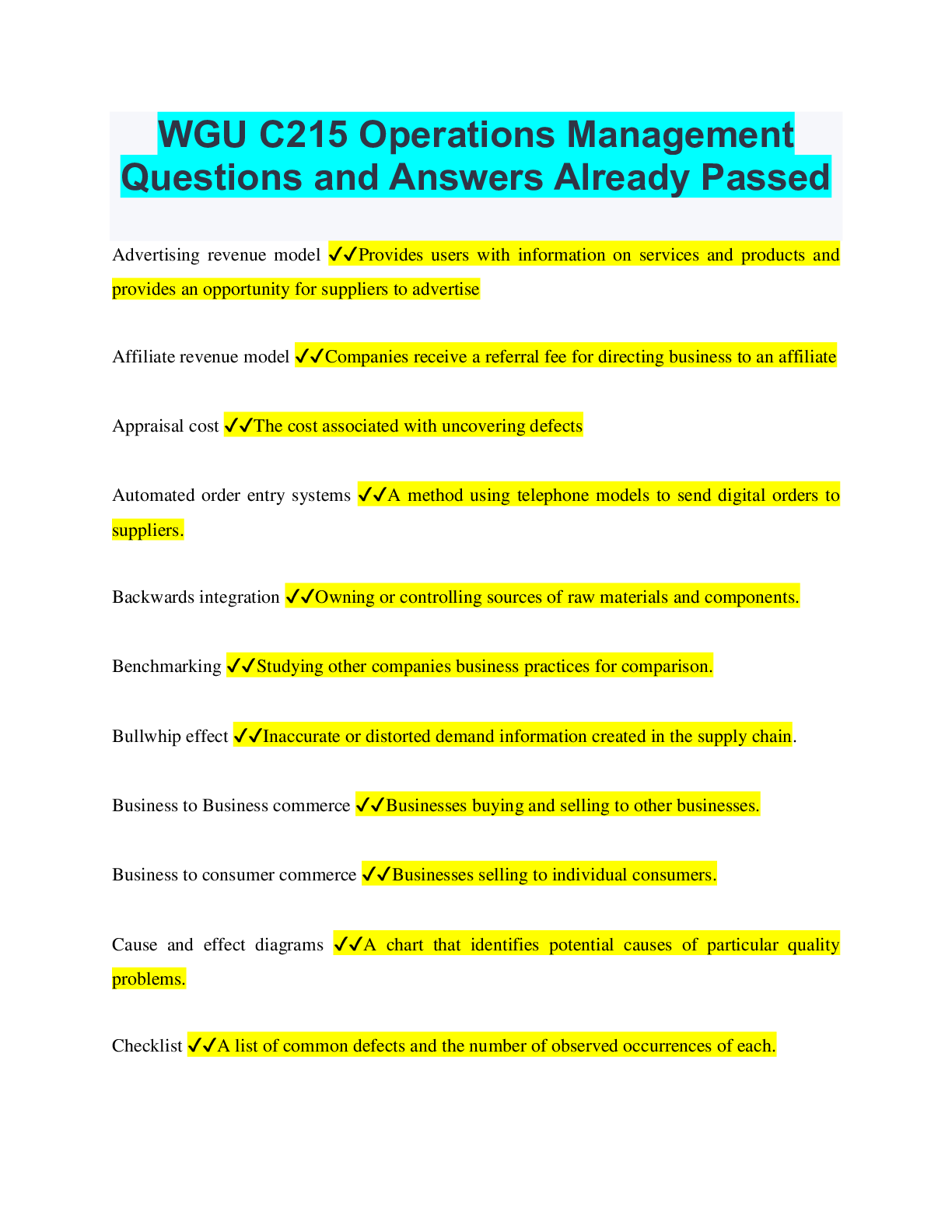
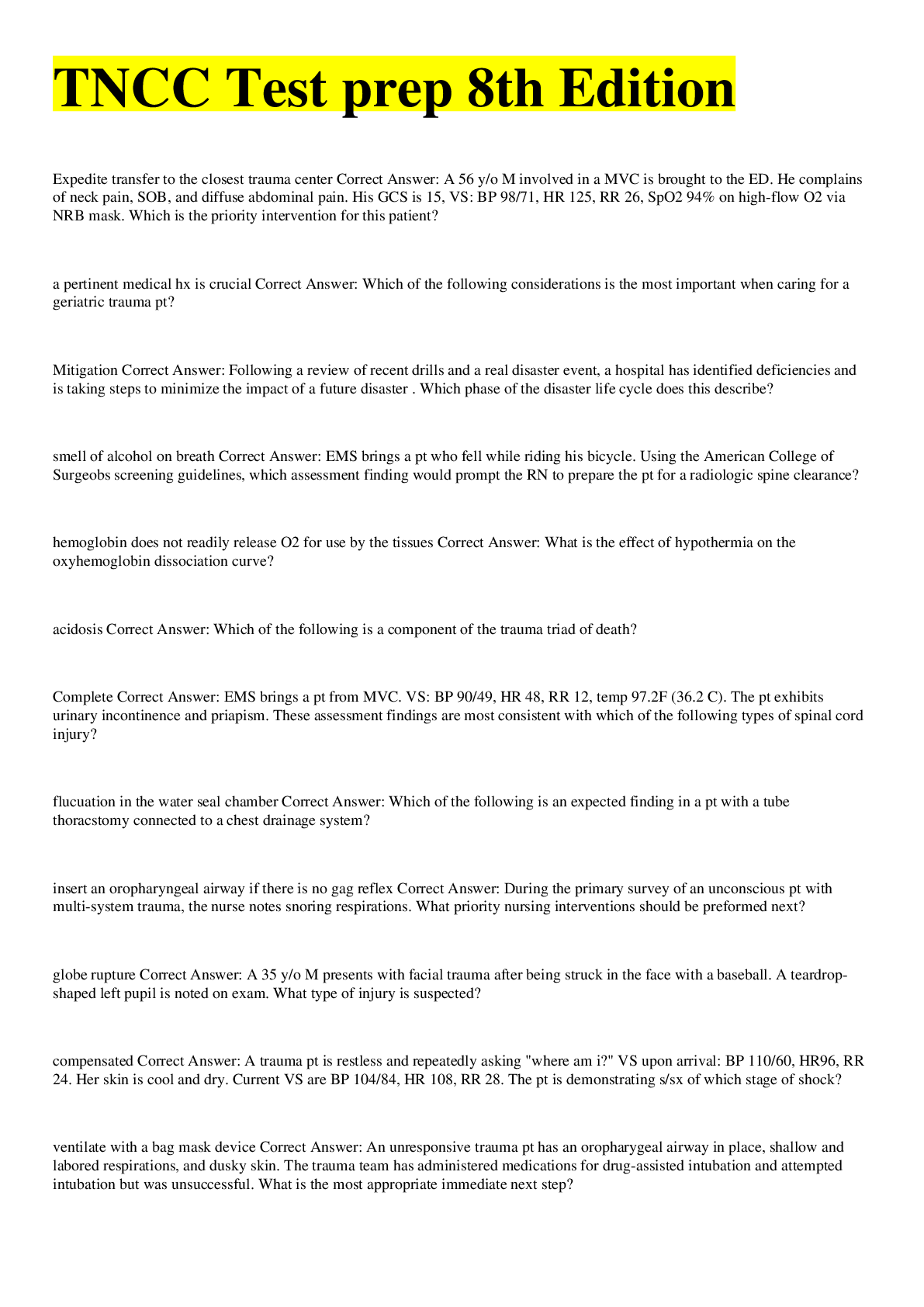
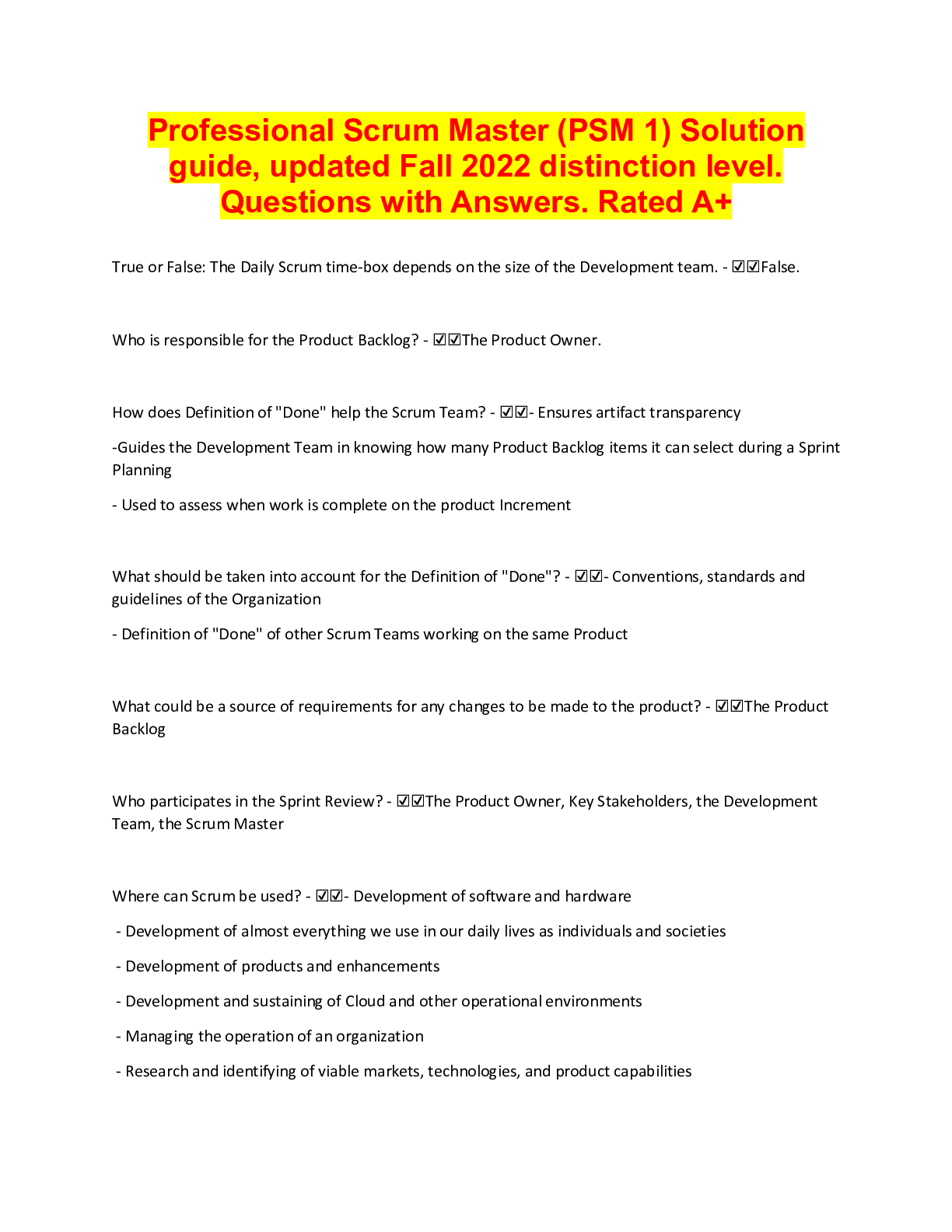
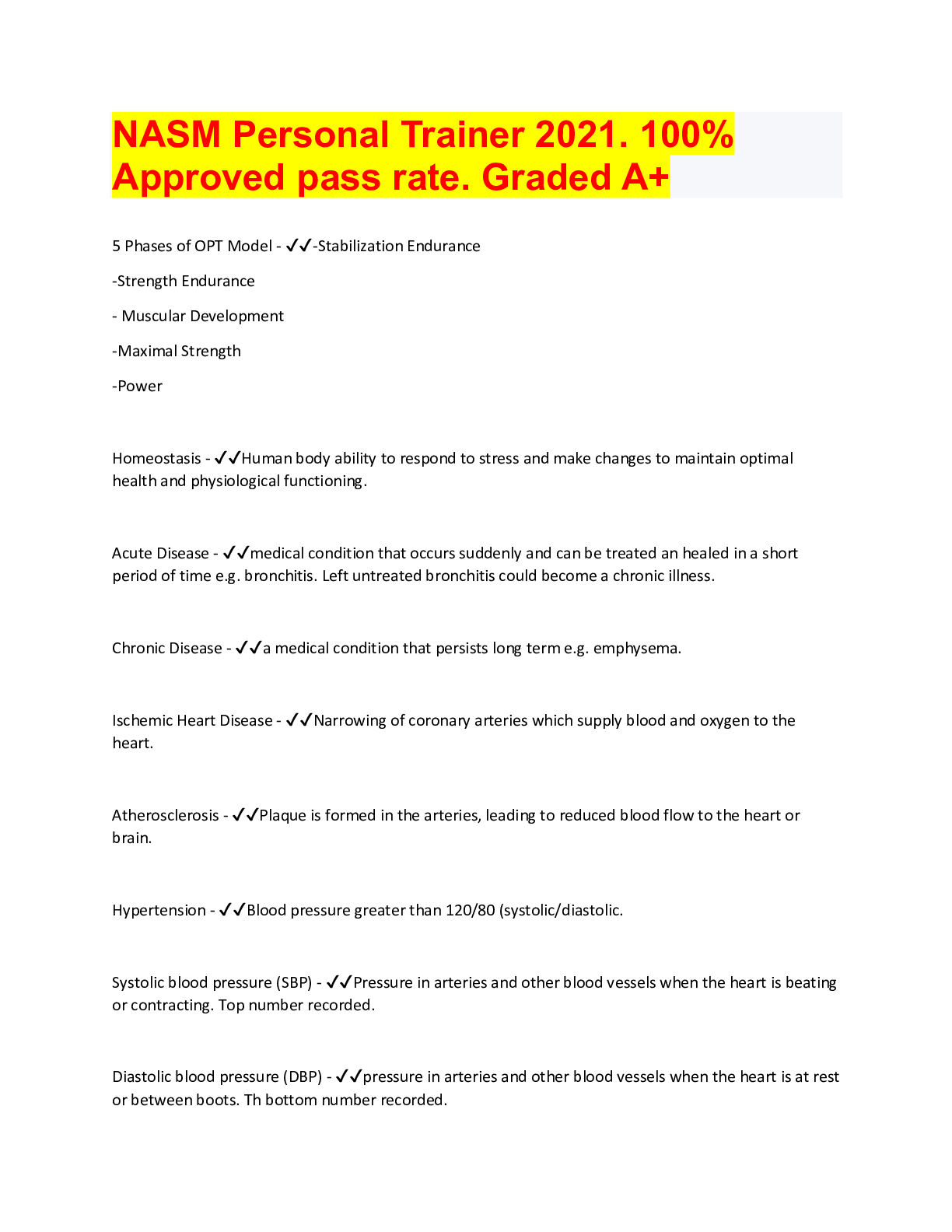
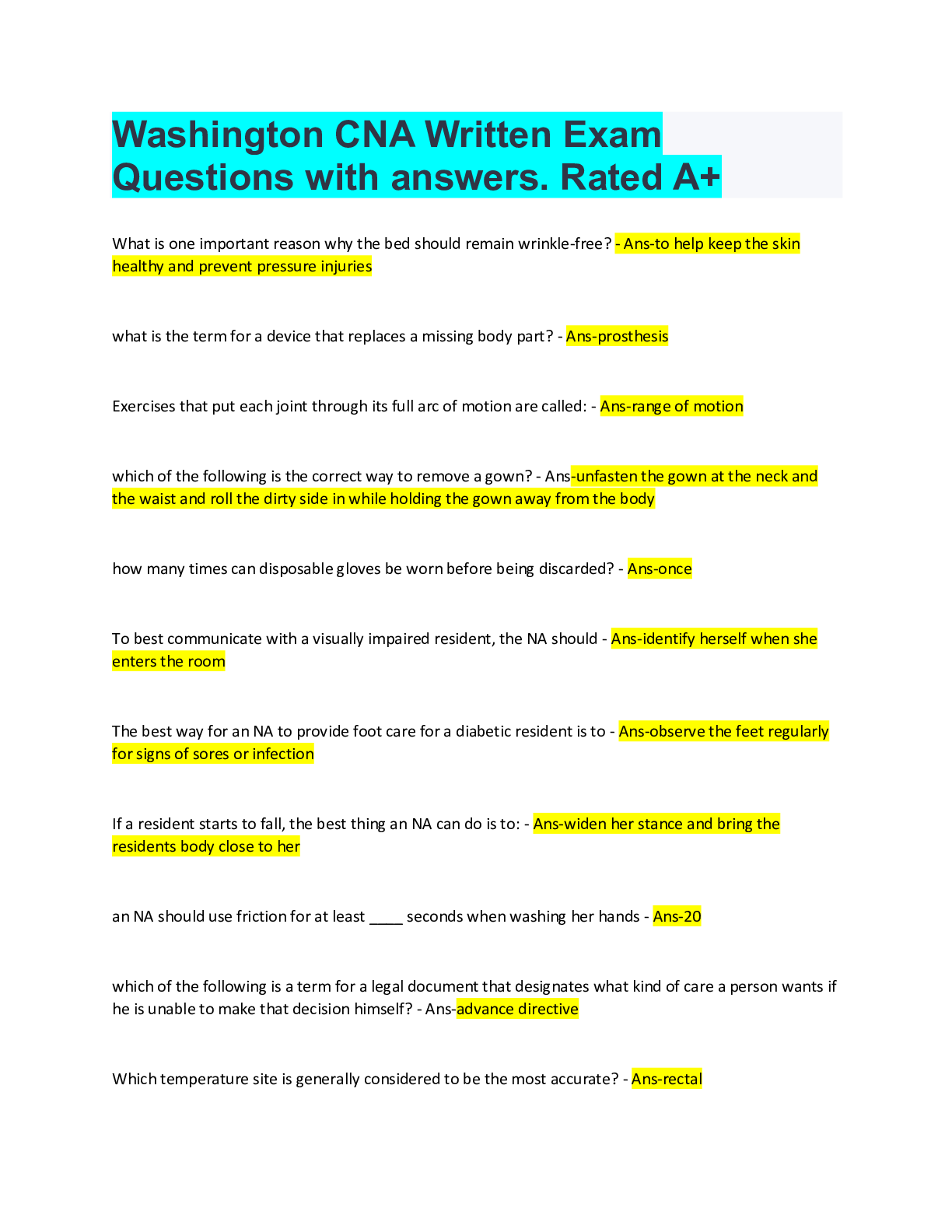
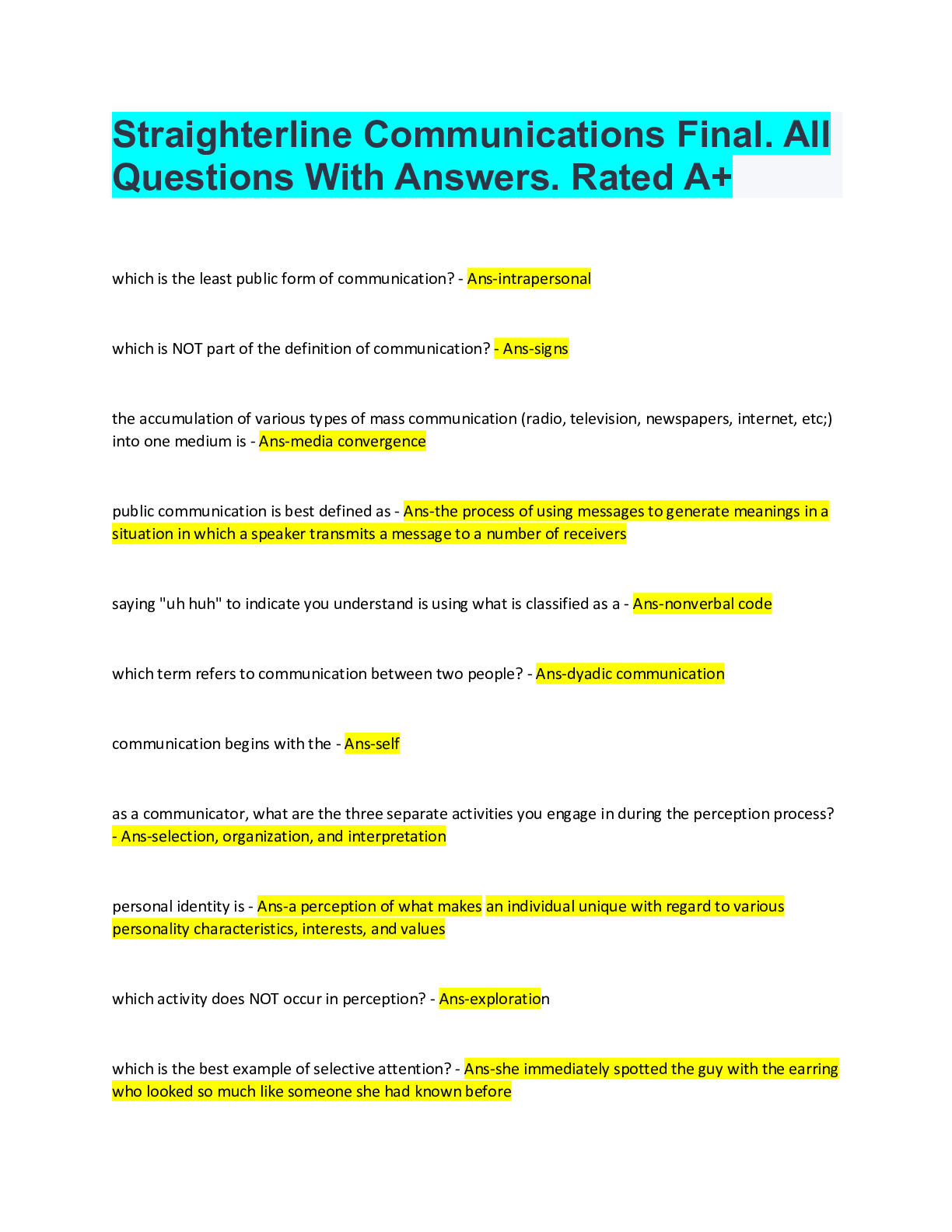
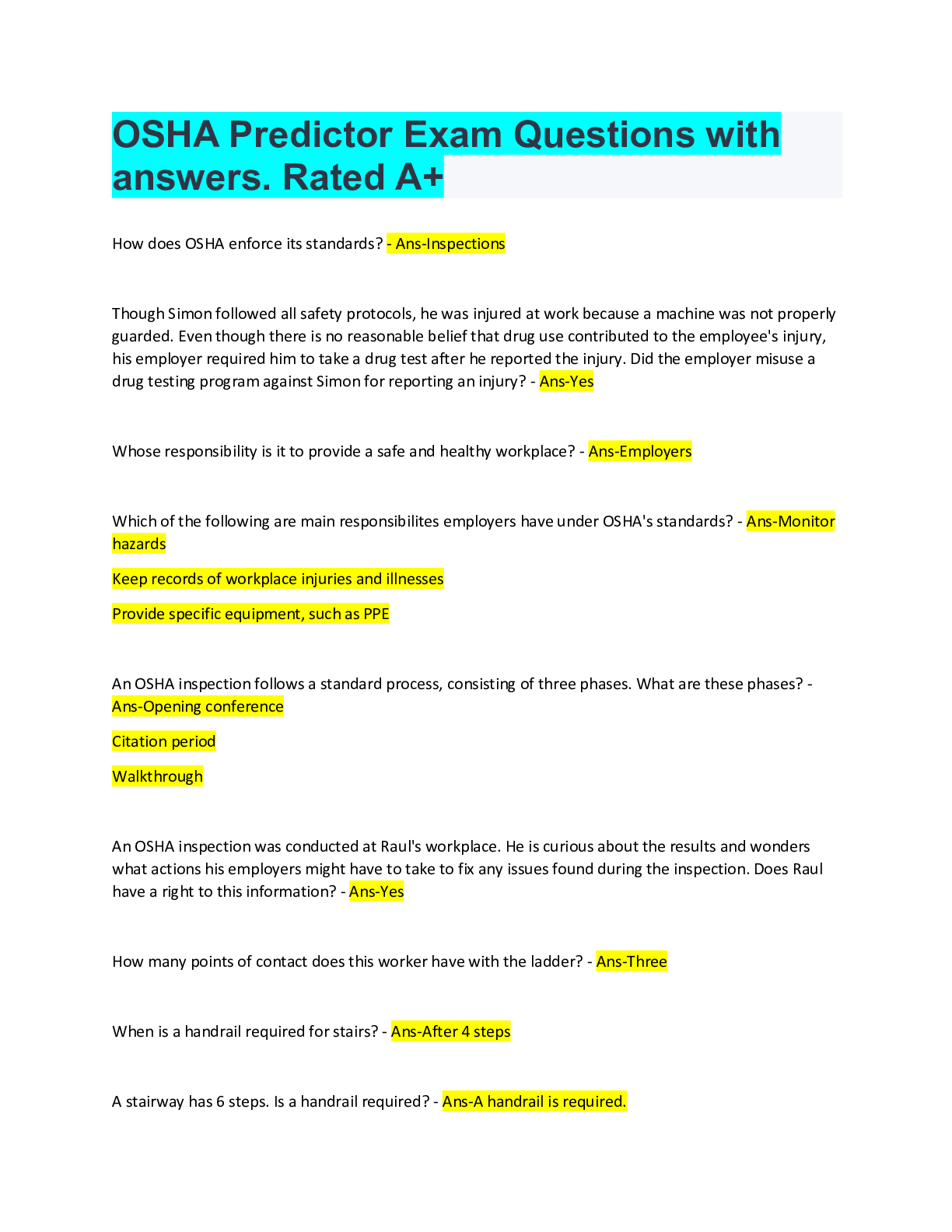
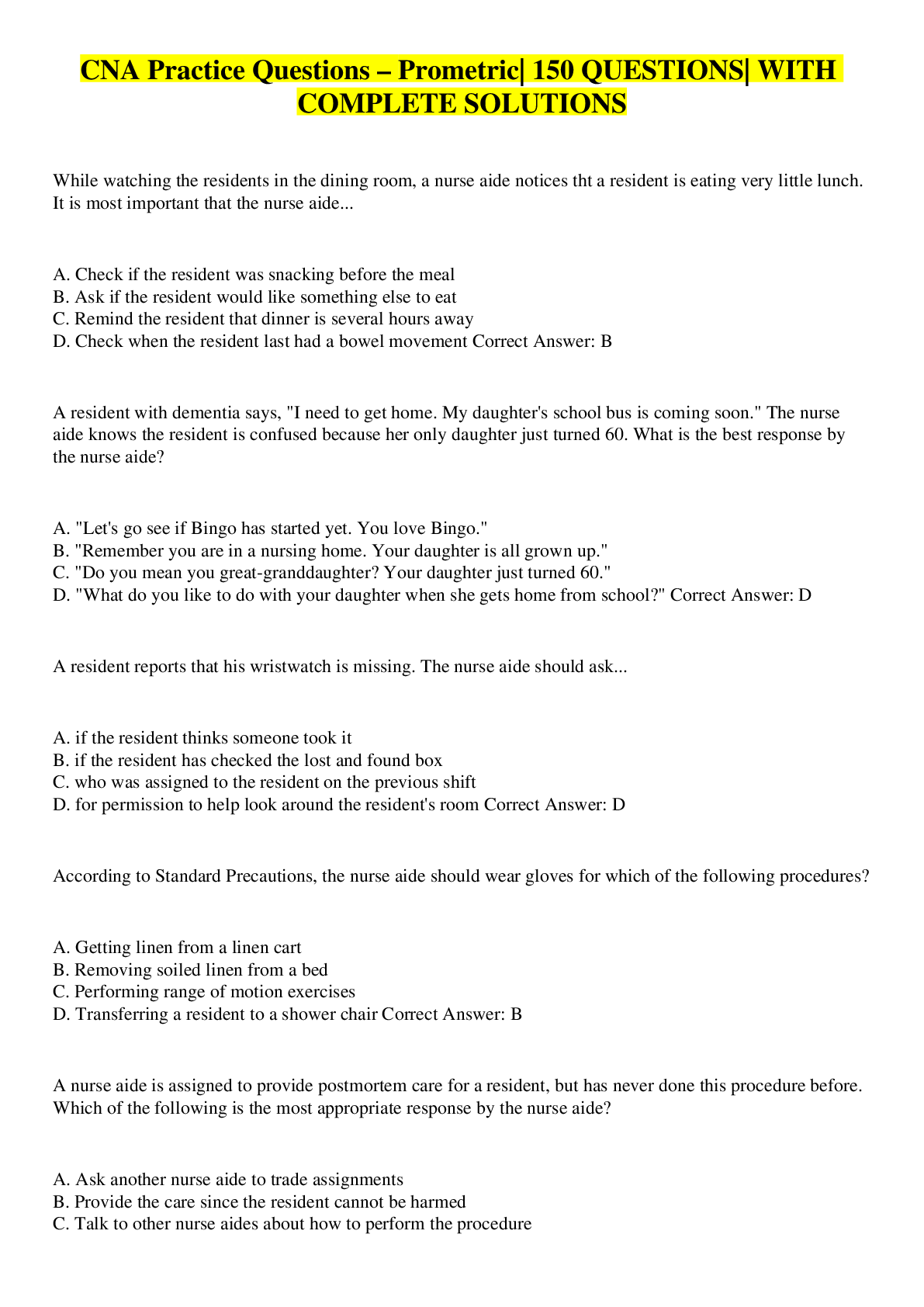
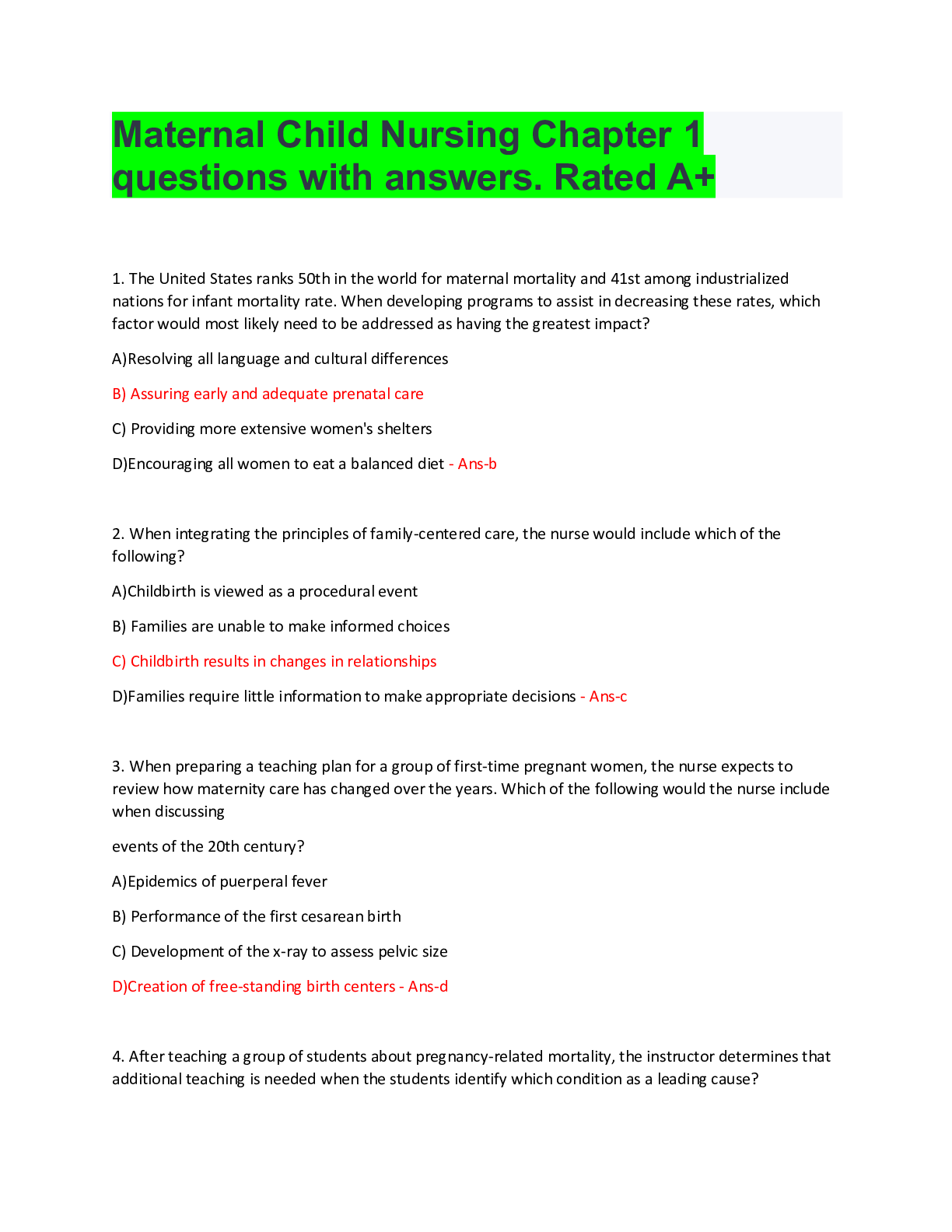
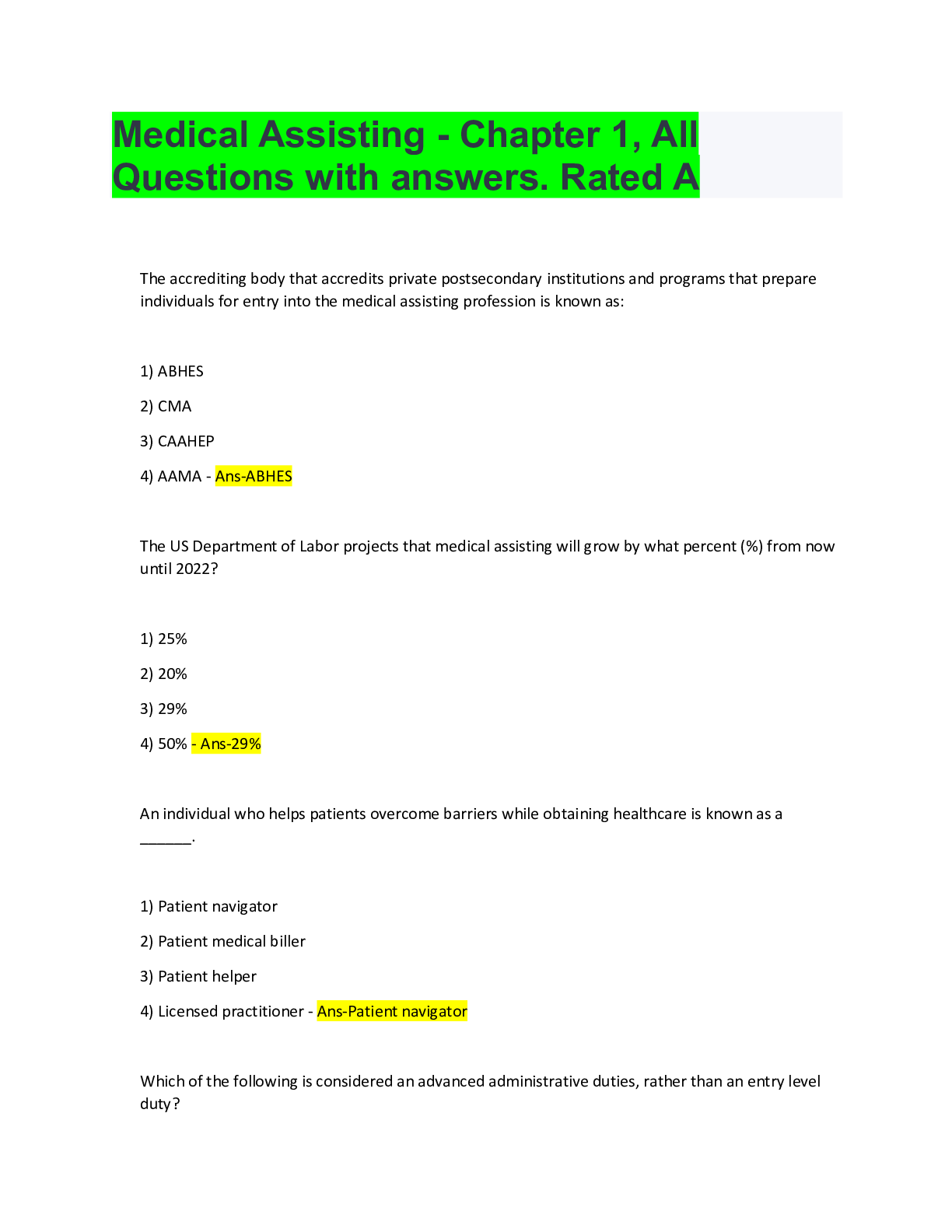
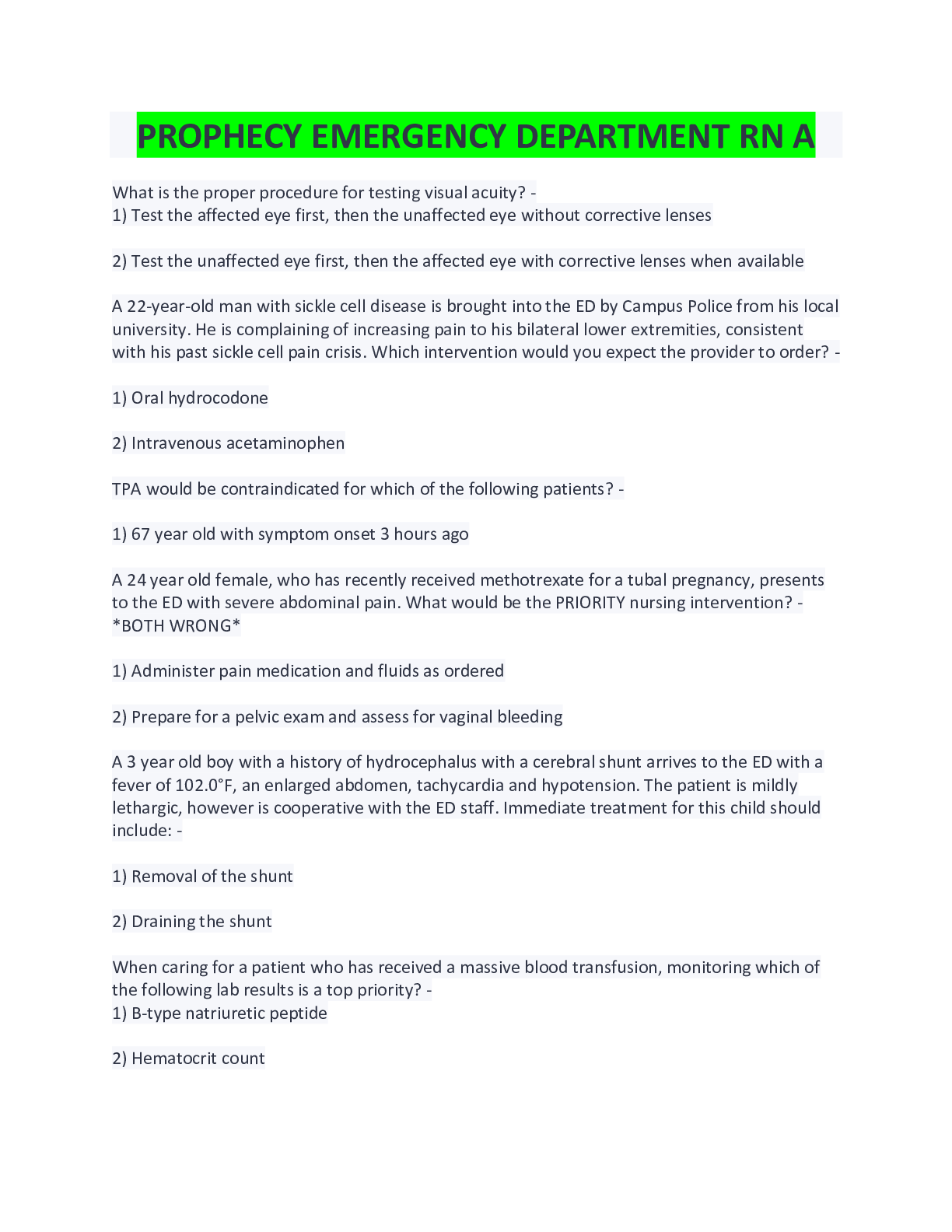
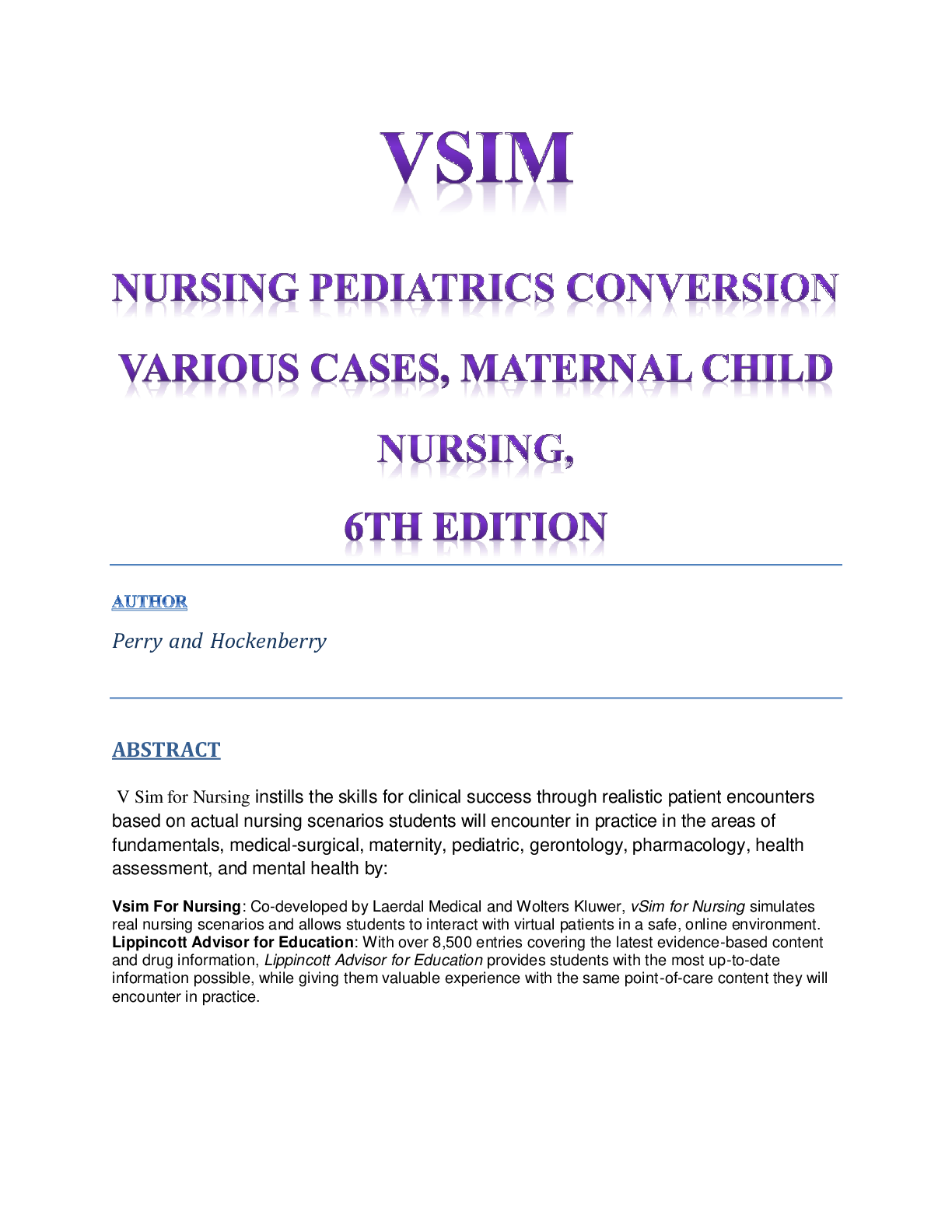

.png)

